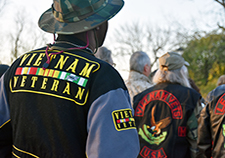Office of Research & Development |
 |
Office of Research & Development |
 |

VA Research Currents archive
December 13, 2016

Vietnam Veterans took part in a March 2016 ceremony at the Lexington (Kentucky) VA Medical Center in commemoration of the war's 50th anniversary. (Photo by Megan Moloney)
In one of the iconic images of the Vietnam War, U.S. C-123s fly side by side spraying herbicides to destroy large, forested areas that were used by the Viet Cong for food and cover. That was the Air Force's Operation Ranch Hand, which accounted for 86 percent of the defoliants and herbicides sprayed by the U.S. military in Vietnam.
The Army Chemical Corps, a less-studied group of Vietnam-era Veterans, also played a key role in defoliation efforts. Using hand-held sprayers and helicopters, troops in the Chemical Corps conducted operations to clear the perimeter of U.S. military installations and to destroy crops in other areas. They also stored, distributed, and mixed defoliants and other chemicals.
Performing these duties potentially exposed them to herbicides that were used during the Vietnam War. The best-known is Agent Orange.
Now, a new VA study has found that exposure to herbicides is "significantly associated" with the risk of hypertension, or high blood pressure, in members of the Army Chemical Corps. Findings from the study, published November 2016 in the Journal of Occupational and Environmental Medicine, point to a higher prevalence of hypertension in Veterans of the Corps who were exposed to herbicides during the war, compared with those who weren't.
"I don't believe research on Vietnam-era Veterans could ever really be final."
The research adds to the scientific evidence linking herbicide exposure with hypertension, a major risk factor for heart disease and stroke and one of the most common ailments in Veterans seeking health care at VA facilities. High blood pressure is also a major problem among the general population of older adults. The new study, though, is among the first to explore the link between herbicides and Army Chemical Corps Veterans.
"Veterans of the Army Chemical Corps represent a unique group of individuals with presumed herbicide and chemical exposures that were most likely greater than those of other Veterans of the Vietnam War," says the study's lead author, Dr. Yasmin Cypel of VA's Epidemiology Program in the Office of Patient Care Services in Washington, D.C.
Cypel cautions that the study isn't "definitive" and doesn't prove by itself that Agent Orange causes hypertension. It only establishes what appears to be a strong correlation between herbicide exposure overall and hypertension.
Also, she says Agent Orange is probably only one of several herbicides these Veterans were potentially exposed to during the war.
The new findings may support a policy change addressing presumptive service connection for hypertension. VA does not currently recognize hypertension as a presumptive disease for Agent Orange-exposed Veterans, but the agency is already treating Veterans for hypertension regardless of exposure to Agent Orange and other herbicides.
Dr. Terra Irons, a toxicologist in VA's Office of Patient Care Services in Washington, says a VA working group will consider the study as part of its ongoing analysis of reports on Agent Orange from the National Academy of Medicine (NAM, formerly the Institute of Medicine) of the National Academies of Science, Engineering, and Medicine, a non-governmental group that provides research and recommendations on public health and science policy.
In March 2016, NAM released its 10th biennial review of health problems linked to Vietnam-era herbicides, suggesting possible links to hypertension, bladder cancer, Parkinson's-like symptoms, and under-active thyroid.
VA's Agent Orange Technical Work Group has been reviewing the NAM report to determine if those illnesses should be added to the list of VA's diseases for which Vietnam Veterans are entitled to health care and disability pay.
If warranted, Irons says, the group will make recommendations to VA's secretary on adding illnesses to the list of 17 presumptive conditions the agency currently recognizes as being tied to herbicide exposure. The decision to add new ailments will be left to the VA secretary appointed by the incoming president.
"For this administration, the deadline for proposing rules addressing potential new presumptions [of service connection to herbicide] has passed, and this will become work for the new administration to take to completion," VA officials said in a written statement.
For the study, researchers analyzed data from 3,086 Army Chemical Corps Veterans who took part in a 2013 survey. The study had been designed and conducted under the leadership of Dr. Han Kang, the retired former director of VA's Epidemiology Program.
The researchers established exposure to herbicides by confirming participants' military occupation, based on personnel records, and by examining levels of herbicide contaminants in blood samples collected in an earlier study. They also used medical record data and in-home examinations by trained technicians to confirm the Veterans' reports of physician-diagnosed self-reported hypertension.
Among survey responders, 81.6 percent who sprayed herbicides in Vietnam said they had high blood pressure. That compares with 72.2 percent who served in Vietnam but didn't spray herbicides, and 64.6 percent who never served in Southeast Asia and didn't spray herbicides.
Non-Vietnam-deployed Chemical Corps members who reported spraying herbicides had a higher prevalence of hypertension (77.4) than non-sprayers, no matter where they served.
Most of the people in the survey, which was divided almost equally between Vietnam and non-Vietnam Veterans, were between the ages of 60 and 69 and white. About 72 percent of Vietnam Veterans were current or former smokers, compared with 64 percent of non-Vietnam Veterans. Smoking is known to raise blood pressure and heart rate.

A UC-123 sprays defoliant as part of Operation Ranch Hand during the Vietnam War. (Photo: National Museum of the U.S. Air Force)
Data in the study did not include risk factors for hypertension such as diabetes, a family history of hypertension, and dietary intake other than alcohol. Mental health issues that contribute to hypertension, such as PTSD, also were not included. There also was a lack of information about the type and amount of chemicals these Veterans were exposed to during the war, making it harder to tie the resulting health effects directly to herbicides.
"It should be noted that it's not only Agent Orange that is relevant here," Cypel says, "but [also] these Veterans' exposure during the war to other herbicides and chemicals, the trauma they experienced as a result of their military involvement, and the overall impact of these various exposures on hypertension."
Still, Cypel believes the study carries much validity, in part because of the rigorous process used to confirm exposure to herbicides.
In addition, "Our response rates were high, which I think could be attributed to the methods used as well as the importance of the research to the Army Chemical Corps population," she says. "These considerations all add to the strength of our findings. However, all research has limitations, and this study is not an exception to that."
Future studies on the broader Vietnam-era Veteran population, Cypel says, could more closely evaluate hypertension-related mortality through a targeted review of the cause of death reported on death certificates.
She refers to the ongoing Vietnam Era Health Retrospective Observational Study (VE-HEROES), led by Dr. Victoria Davey, as one example of the important research now underway. The VA study is assessing the current health and well-being of Vietnam Veterans, Blue Water Navy Veterans, and Veterans who served elsewhere during the Vietnam era (1961-1975). The study is also comparing the health of these Veterans with that of similarly aged U.S. citizens who never served in the military. A mortality study is being planned as part of the VE-HEROES research.
"The definition of definitive implies finality," Cypel says. "I don't believe research on Vietnam-era Veterans could ever really be final."